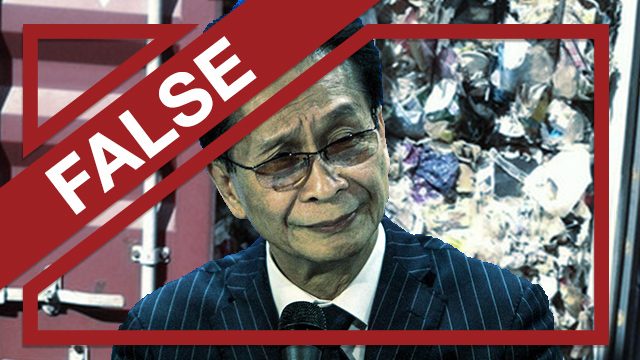SUMMARY
This is AI generated summarization, which may have errors. For context, always refer to the full article.

Claim: Presidential Spokesman and Chief Presidential Legal Counsel Salvador Panelo claimed that the Philippines is not yet a signatory to the Basel Convention during a press briefing on Wednesday, May 22, in Malacañang.
“Hindi pa tayo ‘ata signatory doon di ba. No, inaano nga tayo na mag-sign eh. (We aren’t a signatory there, right? No, they are asking us to sign.) We’re not part of that yet,” he told reporters.
Panelo responded in this manner to parry a concern raised by a reporter about President Rodrigo Duterte’s new order to ship 69 container vans of garbage back to Canada whether or not Canada agrees.
The reporter wondered if the order to “leave” the garbage within Canada’s territorial waters, if Canada refuses to accept the trash, is a violation of the Basel Convention. Panelo replied with his claim that the Philippines is not even a signatory to the agreement.
Rating: FALSE
The Facts: A look at the official Basel Convention website shows that the Philippines signed the Basel Convention on March 22, 1989. It was ratified, meaning approved by Congress, on October 21, 1993. The treaty entered into force in the Philippines on January 19, 1994.
What the Philippines is yet to ratify is the Basel Ban Amendment.
This amendment adds one vital provision to the Basel Convention, one prohibiting developed nations from exporting harmful waste to developing nations. Environmental groups in the Philippines have long called on the government to ratify this amendment to make rich nations like Canada more accountable for their hazardous wastes.
So what if PH is a signatory? The convention requires that the state that will be receiving the garbage give its prior informed consent before the export of the garbage.
“The movement may only proceed if and when all States concerned have given their written consent,” reads an overview of the treaty.
The transboundary movement of hazardous wastes and other wastes that “results in the deliberate disposal (e.g., dumping) of hazardous wastes and other wastes” is deemed “illegal traffic” by the Convention.
If the export of garbage is done illegally, “the Convention attributes responsibility to one or more of the States involved, and imposes the duty to ensure safe disposal, either by re-import into the State of generation or otherwise.”
Duterte is proposing that if Canada does not consent to receiving back its garbage, the Philippines, through a private shipping company, will just dump the trash in Canada’s waters.
“If Canada will not accept the trash, we will leave the same within the territorial waters or 12 nautical miles out to sea from the baseline of any of their country’s shores,” said Panelo.
It’s not clear in what manner the garbage will be disposed of in Canada’s waters. Any method not environmentally-sound will be tantamount to dumping, and thus polluting the ocean. – Rappler.com
Add a comment
How does this make you feel?
There are no comments yet. Add your comment to start the conversation.